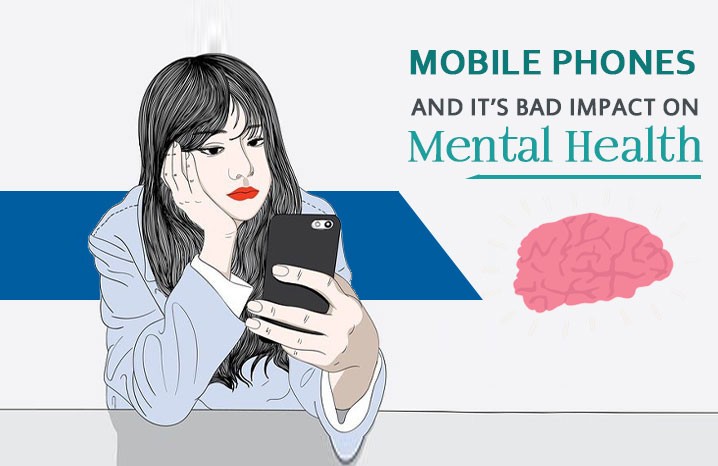
Smartphone usage can have a significant negative impact on children’s development and well-being. Excessive screen time can lead to decreased physical activity, decreased face-to-face communication skills, and poor sleep quality, which can negatively impact their behavior, mental health, and physical health. Children who spend too much time on their Smartphones may also be at an increased risk for cyberbullying and decreased empathy and emotional intelligence. Overreliance on Smartphones for information and problem-solving can also decrease creativity and critical thinking skills in children. It is important for parents and caregivers to set healthy boundaries around Smartphone usage and encourage children to engage in activities that promote physical, social, and emotional development.
Here is the list of the harmful impact of smartphone on children behavior in several ways:
-
Addiction:
 Smartphone addiction in children refers to a pattern of excessive or compulsive use of Smartphone that interferes with daily activities, relationships, and overall well-being. Children who are addicted to their Smartphone may prioritize spending time on their devices over other activities, struggle to limit their use, and feel irritable or restless when they are unable to access their devices. There are several factors that contribute to Smartphone addiction in children, including social pressure, access to a wide range of engaging and addictive content, and a lack of parental oversight or guidance. In addition, some children may be genetically predisposed to addictive behavior. Smartphone addiction can have a number of negative consequences for children, including disrupted sleep patterns, decreased physical activity, decreased social interaction and communication skills, and decreased academic performance. In addition, excessive screen time has been linked to increased rates of depression, anxiety, and other mental health problems in children.
Smartphone addiction in children refers to a pattern of excessive or compulsive use of Smartphone that interferes with daily activities, relationships, and overall well-being. Children who are addicted to their Smartphone may prioritize spending time on their devices over other activities, struggle to limit their use, and feel irritable or restless when they are unable to access their devices. There are several factors that contribute to Smartphone addiction in children, including social pressure, access to a wide range of engaging and addictive content, and a lack of parental oversight or guidance. In addition, some children may be genetically predisposed to addictive behavior. Smartphone addiction can have a number of negative consequences for children, including disrupted sleep patterns, decreased physical activity, decreased social interaction and communication skills, and decreased academic performance. In addition, excessive screen time has been linked to increased rates of depression, anxiety, and other mental health problems in children.
It is important for parents to monitor their children’s Smartphone use and to establish clear rules and guidelines to help prevent addiction. Parents can also encourage alternative activities, such as outdoor play, reading, and spending time with family and friends, and help their children develop healthy habits around technology use. -
Physical & Mental health problems:

The excessive use of mobileamong children can lead to several physical and mental health problems, including:
-
Physical health problems:
- Poor posture and back pain: Children may hunch over their devices for long periods, leading to poor posture and neck, back, and shoulder pain.
- Eye strain and vision problems: The blue light emitted by smartphone screens can cause eye strain and disrupt sleep patterns, leading to headaches and fatigue. In severe cases, it can cause nearsightedness and other vision problems.
- Repetitive strain injuries: Children may develop repetitive strain injuries from playing video games or texting on their devices for extended periods.
-
Mental health problems:
-
-
-
- Anxiety and depression: Children who spend a lot of time on their devices may experience feelings of anxiety, depression, and low self-esteem, especially if they are constantly comparing themselves to others on social media.
- Interrupted sleep patterns: The blue light emitted by Smartphone screens can interfere with sleep patterns, leading to sleep deprivation and related problems like irritability and fatigue.
- Decreased attention span and concentration: The constant stimulation of a Smartphone can lead to decreased attention span and difficulty concentrating on tasks that require sustained attention, like reading or doing homework. It’s important for parents to monitor their children’s Smartphone use and help them establish healthy habits, such as taking regular breaks and limiting screen time before bed.
-
-
-
Other Bad Impacts:
- Social isolation: Spending too much time on smartphones can lead to decreased face-to-face social interaction and increased feelings of loneliness and isolation.
- Decreased productivity: Distractions from notifications and apps can lead to decreased productivity and difficulty focusing on tasks.
- Cyberbullying: The anonymity and accessibility provided by smartphones can increase the occurrence of cyberbullying and online harassment.
- Decreased physical activity: Spending excessive time on smartphones can lead to decreased physical activity and an increased risk of sedentary lifestyle-related health problems.
- Decreased impulse control: The instant gratification provided by smartphones can lead to decreased impulse control and difficulty delaying gratification.
- Decreased creativity and critical thinking: Overreliance on smartphones for information and problem-solving can decrease creativity and critical thinking skills.
-
How You can deal with this?

Dealing with smartphone issues in children and avoiding excessive use of mobile devices can be a challenge for many parents. Here are some tips that may help:
- Set Limits: Establish clear and realistic rules for your child’s smartphone usage, including time limits and specific times of day when the phone should be put away. Consider using parental control tools to help enforce these limits.
- Model Good Behavior: Children learn by example, so make sure you’re setting a good one when it comes to your own smartphone usage. Try to minimize your own screen time in front of your children and avoid checking your phone during meals or family time.
- Encourage Alternative Activities: Encourage your child to engage in a variety of other activities, such as playing sports, reading, or spending time with friends and family.
- Teach Digital Citizenship: Help your child understand the importance of responsible and respectful behavior online, including the dangers of cyberbullying and sharing personal information.
- Be Involved: Stay involved in your child’s digital life and be open to having regular conversations with them about their smartphone usage and any concerns you may have.
- Don’t offer mobile usage as a reward:
As a parent, it can be tempting to offer a smartphone or other mobile device as a reward for good behavior, such as taking a meal or following rules. However, it’s important to understand that this approach can have negative consequences in the long run. - Encourage positive behavior in your child:
To encourage positive behavior in your child, it’s recommended to take a different approach:
-
- Foster a positive environment: Create a supportive and encouraging environment for your child by focusing on positive reinforcement and healthy communication.
- Set clear expectations: Establish clear expectations for your child’s behavior and the consequences for not following them in a consistent and fair manner.
- Avoid using bribes: Bribing your child with screen time reinforces the idea that good behavior is only performed in exchange for a reward, and can have negative consequences on their relationship with technology and their overall development.
- Encourage alternative activities: Encourage your child to engage in a variety of activities that don’t involve screens, such as playing sports, reading, or spending time with friends and family.By focusing on creating a positive environment, setting clear expectations, avoiding bribes, and encouraging alternative activities, you can help your child develop positive behaviors that are not solely based on external rewards. Remember, it’s important to strike a balance between technology and real-life experiences. By setting limits, encouraging alternative activities, and being involved in your child’s digital life, you can help them use technology in a healthy and responsible way.
Conclusion:
In conclusion, the excessive use of smartphones among children can have several negative impacts on their physical, mental, and emotional well-being. Children who spend a lot of time on their devices may experience eye strain, poor posture, anxiety, depression, and decreased attention span, among other problems. It’s important for parents to monitor their children’s smartphone use and help them establish healthy habits, such as taking regular breaks and limiting screen time before bed. Offering a smartphone or other mobile device as a reward for good behavior, such as taking a meal or following rules, can have negative consequences in the long run. To encourage positive behavior in your child, it’s recommended to focus on fostering a positive environment, setting clear expectations, avoiding bribes, and encouraging alternative activities. By taking these steps, you can help your child develop positive behaviors that are not solely based on external rewards and create a healthy relationship with technology.














